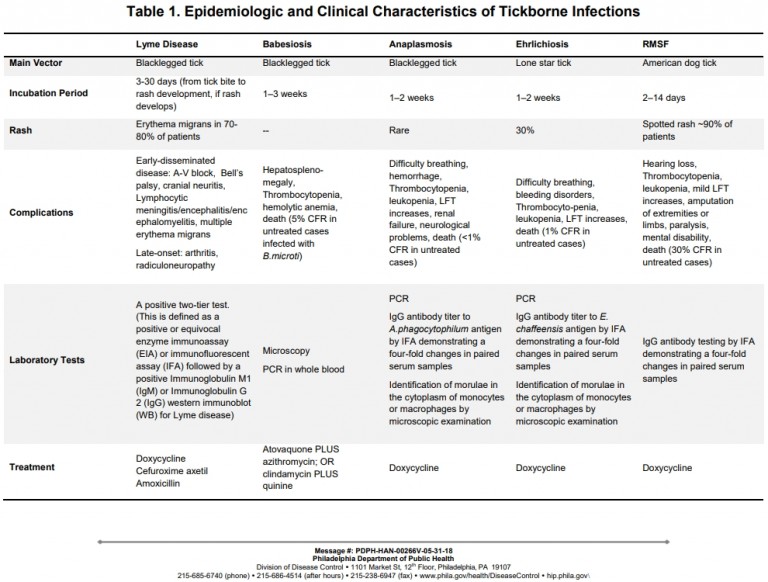The height of the 2018 season for tickborne infections in Philadelphia and surrounding areas is upon us. While Lyme disease is the most frequently diagnosed tickborne illness in Philadelphia residents, cases of babesiosis, anaplasmosis, ehrlichiosis, and Rocky Mountain spotted fever (RMSF) are reported every year. Highlighting the potential for tickborne infections in Philadelphia, 43% of blacklegged ticks collected in City parks since 2013 have tested positive for Lyme disease, while 5% and 4% tested positive for anaplasmosis and babesiosis, respectively.
Providers should also be aware of emerging tickborne infections, like Powassan virus and Borrelia miyamotoi that are transmitted by blacklegged ticks and have been identified in northern Pennsylvania counties, New Jersey, and New York. Powassan virus infection can cause meningoencephalitis similar to West Nile virus, and Borrelia miyamotoi can cause relapsing febrile illness.
Patients presenting with rash or “flu-like” symptoms, including fever, fatigue, and lymphadenopathy, should be evaluated for tickborne illnesses during months of increased tick activity (April–October). See Table 1 (below) for further details on tickborne disease symptoms and diagnostic testing. Please remember to report all suspected or confirmed cases of babesiosis, anaplasmosis, ehrlichiosis, RMSF, and Lyme disease (including clinicallydiagnosed erythema migrans) within 5 days to PDPH by telephone at (215) 685-6748 or fax at (215) 238-6947. For tickborne disease testing inquiries, call (215) 685-6742.
Tick Bite Prevention
– Providers should advise patients to take the following tick bite prevention tips when spending time outdoors:
– Wear insect repellent that contains DEET (≥20%) or another EPA-approved repellent and reapply as directed. Wearing clothing and gear that has been treated with permethrin will also help repel ticks.
– Avoid ticks by walking in the center of trails and staying away from wooded or brushy areas with high grass and leaf litter.
– Conduct a full-body tick check and shower or bathe within two hours of returning indoors. Remove attached ticks with fine-tipped tweezers.
– Place clothes in a dryer on high heat for 10 minutes to kill ticks.
– Check pets for ticks daily, especially after spending time outdoors, and use tick repellent products.
Provider Resources
– The Philadelphia Department of Public Health is offering an onsite presentation entitled Overview of Tickborne Diseases in Philadelphia. For questions or to schedule a presentation at your facility, contact Emily Kehoe, MPH via telephone at (215) 685-4502 or email at [email protected].
– Tickborne diseases of the United States. A Reference Manual for Health Care Providers: http://www.cdc.gov/lyme/resources/tickbornediseases.pdf
– HHS Working Group on Lyme and Other Tickborne Diseases Presents: Trends in Tickborne Diseases in the United States: https://www.youtube.com/watch?v=p6ZlEcaJDrw
– Free prevention education materials for patients from the CDC: https://www.cdc.gov/lyme/toolkit/
– Philadelphia-specific tickborne disease surveillance updates on PDPH’s Health Information Portal: https://hip.phila.gov/DataReports/TickborneDiseases
Originally released by the Philadelphia Department of Public Health on May 31, 2018





